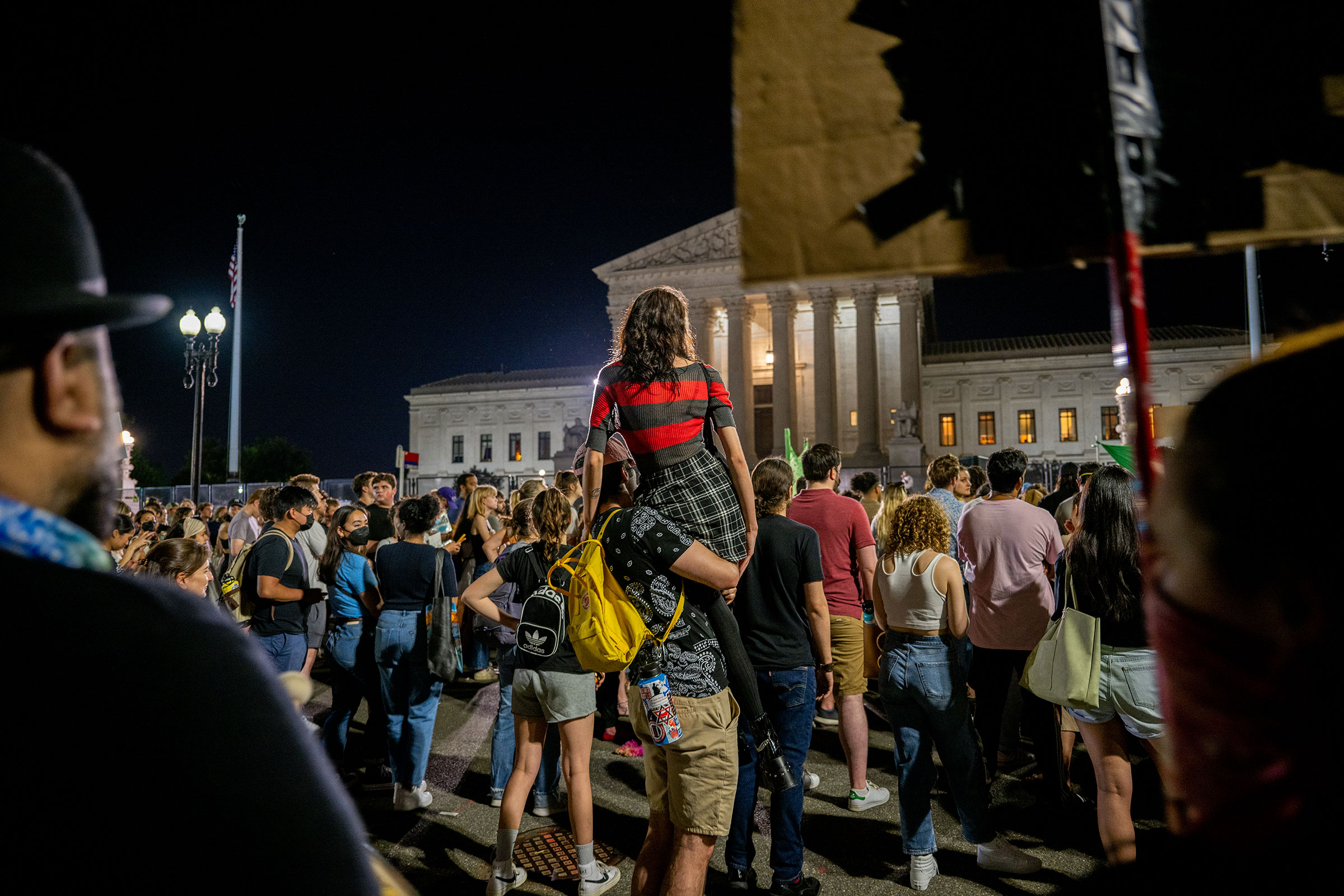
For Christina Monroe, dating apps are a useful way to handle the politics conversation early in a potential relationship. The 29-year-old media strategist shares on her profiles that her political views are “leftist” and uses prompts to encourage potential matches to share their own leanings. For Monroe, being politically aligned with romantic partners has become a bigger issue since she relocated last year from New York City to Hollywood, Fla.
“I consider myself to be a very progressive person, but now I’m in Florida, where it’s kind of the opposite—everyone’s either very moderate or conservative, or completely apolitical,” she says. “I have no tolerance for somebody who’s apolitical. If you don’t care about what’s going on with women, whether that’s Me Too or Roe v. Wade, then I just don’t think there’s going to be any sort of intellectual connection there.”
Monroe isn’t alone. Politics and social issues have had a major impact on how singles across the U.S. are approaching dating in 2022, with the landmark Dobbs v. Jackson Women’s Health decision this June having an especially significant effect. According to the 2022 Match Singles in America report, released this week, two out of three single women say they will not date a partner who has opposing views on abortion, and 13% of active daters in the U.S.—about 9.8 million people—have said that the decision to overturn Roe v. Wade has made them more hesitant to date. Even more people, 20% of respondents, said that the Supreme Court decision will make them more hesitant to have sex. Singles surveyed reported that the top three ways that Roe’s reversal has changed their dating lives have been more condom use, more hesitation around sex, and more fear of pregnancy.
For the study, Match’s 12th annual report, researchers surveyed 5,000 single people between the ages of 18 and 98 across the U.S., finding that societal issues are top of mind this year for singles looking for love. When it came to questions about politics more broadly, the report found that a lack of political engagement is a red flag for many daters: 31% of respondents said that having no opinion on key issues is a reason to call a relationship quits—nearly double the percentage who said the same five years ago.
But singles also emphasized the importance of open-mindedness: 58% considered it a deal breaker if a partner wasn’t open-minded on key issues, and 46% said they would date someone with very different political views. Only one in four said they want a partner who thinks exactly like they do.
Anthropologist Helen Fisher, Match’s Chief Scientific Advisor, who helped co-lead the study, was struck by the tension within the results between the relative openness of singles when it came to general politics and their inflexibility when it came to the issue of abortion. “That’s because politics change, but the implications of Roe v. Wade will never change,” Fisher says. “Political figures come and go, but it is part of our DNA to want to raise our families when we want, the way we want.”
More from TIME
For all the impact that singles reported the Dobbs decision has had on their dating lives, not all respondents felt positively about having the conversation: 25% of women said they would like to speak less with their partners about abortion.
Read more: The Fight Over Abortion Has Only Just Begun
Monroe has found it sobering to be living in Florida during the rollback of Roe v. Wade. While abortions are still legal in the state, a ban on the procedure at 15 weeks has recently been reinstated. And she says that the decision has also made her far less willing to entertain the idea of dating someone who hasn’t been vocal about supporting access to abortion.
“I’m in a state now where it’s not as easily accessible for me to get an abortion or seek help, and that definitely weighs heavily on how I approach sex and dating,” she says. “If a man I was speaking with didn’t think my rights should be protected, I would absolutely never see them again.”
For some singles, concerns around abortion access have led to them reconsider their means of contraception. Zevi Ryan, a 30-year-old DJ and producer living in New Orleans, has long considered getting a vasectomy at some point because he doesn’t want children. Since the Dobbs decision, Ryan has begun considering it with more urgency—something on the minds of many men.
“A lot of female-bodied people have to either alter their hormones or go through a painful procedure just to make sure they don’t have unwanted children,” he says. “The procedure we go through is very routine, not very painful, and rarely has any side effects, so it just felt right.”
Read more: Vasectomies Are Going Viral After the Roe v. Wade Leak, But They Aren’t a Solution to Abortion Bans
Maria Avgitidis, the CEO of Agape Match in New York City and the host of the podcast Ask a Matchmaker, sees the impact of the Dobbs decision on dating as part of a larger trend of social consciousness that she saw emerge in 2015 after Donald Trump announced he was running for President. She says that the singles she works with, particularly women, are now asking to be matched with people who share their views on politics and abortion.
“That political consciousness is certainly at the highest I’ve personally seen as a professional matchmaker in 14 years,” she says. “People are articulating what they’re looking for.”
More Must-Reads from TIME
- Introducing the 2024 TIME100 Next
- The Reinvention of J.D. Vance
- How to Survive Election Season Without Losing Your Mind
- Welcome to the Golden Age of Scams
- Did the Pandemic Break Our Brains?
- The Many Lives of Jack Antonoff
- 33 True Crime Documentaries That Shaped the Genre
- Why Gut Health Issues Are More Common in Women
Write to Cady Lang at cady.lang@timemagazine.com